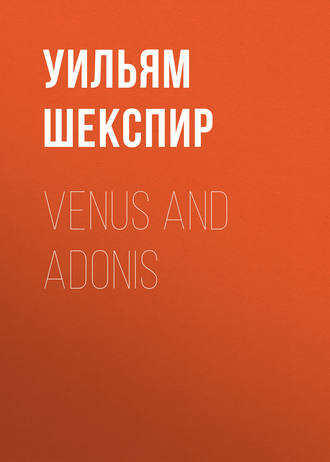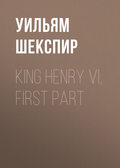полная версия

Уильям Шекспир
Venus and Adonis
I prophesy thy death, my living sorrow,
If thou encounter with the boar to-morrow.
'But if thou needs wilt hunt, be rul'd by me;
Uncouple at the timorous flying hare,
Or at the fox which lives by subtilty,
Or at the roe which no encounter dare:
Pursue these fearful creatures o'er the downs,
And on thy well-breath'd horse keep with thy hound.
'And when thou hast on foot the purblind hare,
Mark the poor wretch, to overshoot his troubles
How he outruns the winds, and with what care
He cranks and crosses with a thousand doubles:
The many musits through the which he goes
Are like a labyrinth to amaze his foes.
'Sometime he runs among a flock of sheep,
To make the cunning hounds mistake their smell,
And sometime where earth-delving conies keep,
To stop the loud pursuers in their yell,
And sometime sorteth with a herd of deer;
Danger deviseth shifts, wit waits on fear:
'For there his smell with others being mingled,
The hot scent-snuffing hounds are driven to doubt,
Ceasing their clamorous cry till they have singled
With much ado the cold fault cleanly out;
Then do they spend their mouths: Echo replies,
As if another chase were in the skies.
'By this, poor Wat, far off upon a hill,
Stands on his hinder legs with listening ear,
To hearken if his foes pursue him still:
Anon their loud alarums he doth hear;
And now his grief may be compared well
To one sore sick that hears the passing bell.
'Then shalt thou see the dew-bedabbled wretch
Turn, and return, indenting with the way;
Each envious briar his weary legs doth scratch,
Each shadow makes him stop, each murmur stay:
For misery is trodden on by many,
And being low never reliev'd by any.
'Lie quietly, and hear a little more;
Nay, do not struggle, for thou shalt not rise:
To make thee hate the hunting of the boar,
Unlike myself thou hear'st me moralize,
Applying this to that, and so to so;
For love can comment upon every woe.
'Where did I leave?' 'No matter where,' quoth he
'Leave me, and then the story aptly ends:
The night is spent,' 'Why, what of that?' quoth she.
'I am,' quoth he, 'expected of my friends;
And now 'tis dark, and going I shall fall.'
'In night,' quoth she, 'desire sees best of all.'
But if thou fall, O! then imagine this,
The earth, in love with thee, thy footing trips,
And all is but to rob thee of a kiss.
Rich preys make true men thieves; so do thy lips
Make modest Dian cloudy and forlorn,
Lest she should steal a kiss and die forsworn.
'Now of this dark night I perceive the reason:
Cynthia for shame obscures her silver shine
Till forging Nature be condemn'd of treason,
For stealing moulds from heaven that were divine;
Wherein she fram'd thee in high heaven's despite,
To shame the sun by day and her by night.
'And therefore hath she brib'd the Destinies,
To cross the curious workmanship of nature
To mingle beauty with infirmities,
And pure perfection with impure defeature;
Making it subject to the tyranny
Of mad mischances and much misery;
'As burning fevers, agues pale and faint,
Life-poisoning pestilence and frenzies wood,
The marrow-eating sickness, whose attains
Disorder breeds by heating of the blood;
Surfeits, imposthumes, grief, and damn'd despair,
Swear nature's death for framing thee so fair.
'And not the least of all these maladies
But in one minute's fight brings beauty under:
Both favour, savour hue, and qualities,
Whereat the impartial gazer late did wonder,
Are on the sudden wasted, thaw'd and done,
As mountain-snow melts with the mid-day sun.
'Therefore, despite of fruitless chastity,
Love-lacking vestals and self-loving nuns,
That on the earth would breed a scarcity
And barren dearth of daughters and of sons,
Be prodigal: the lamp that burns by night
Dries up his oil to lend the world his light.
'What is thy body but a swallowing grave,
Seeming to bury that posterity
Which by the rights of time thou needs must have,
If thou destroy them not in dark obscurity?
If so, the world will hold thee in disdain,
Sith in thy pride so fair a hope is slain.
'So in thyself thyself art made away;
A mischief worse than civil home-bred strife,
Or theirs whose desperate hands themselves do slay,
Or butcher-sire that reeves his son of life.
Foul-cankering rust the hidden treasure frets,
But gold that's put to use more gold begets.'
'Nay then,' quoth Adon, 'you will fall again
Into your idle over-handled theme;
The kiss I gave you is bestow'd in vain,
And all in vain you strive against the stream;
For by this black-fac'd night, desire's foul nurse,
Your treatise makes me like you worse and worse.
'If love have lent you twenty thousand tongues,
And every tongue more moving than your own,
Bewitching like the wanton mermaid's songs,
Yet from mine ear the tempting tune is blown;
For know, my heart stands armed in mine ear,
And will not let a false sound enter there;
'Lest the deceiving harmony should run
Into the quiet closure of my breast;
And then my little heart were quite undone,
In his bedchamber to be barr'd of rest.
No, lady, no; my heart longs not to groan,
But soundly sleeps, while now it sleeps alone.
'What have you urg'd that I cannot reprove?
The path is smooth that leadeth on to danger;
I hate not love, but your device in love
That lends embracements unto every stranger.
You do it for increase: O strange excuse!
When reason is the bawd to lust's abuse.
'Call it not, love, for Love to heaven is fled,
Since sweating Lust on earth usurp'd his name;
Under whose simple semblance he hath fed
Upon fresh beauty, blotting it with blame;
Which the hot tyrant stains and soon bereaves,
As caterpillars do the tender leaves.
'Love comforteth like sunshine after rain,
But Lust's effect is tempest after sun;
Love's gentle spring doth always fresh remain,
Lust's winter comes ere summer half be done.
Love surfeits not, Lust like a glutton dies;
Love is all truth, Lust full of forged lies.
'More I could tell, but more I dare not say;
The text is old, the orator too green.
Therefore, in sadness, now I will away;
My face is full of shame, my heart of teen:
Mine ears, that to your wanton talk attended
Do burn themselves for having so offended.'
With this he breaketh from the sweet embrace
Of those fair arms which bound him to her breast,
And homeward through the dark laund runs apace;
Leaves Love upon her back deeply distress'd.
Look, how a bright star shooteth from the sky
So glides he in the night from Venus' eye;
Which after him she darts, as one on shore
Gazing upon a late-embarked friend,
Till the wild waves will have him seen no more,
Whose ridges with the meeting clouds contend:
So did the merciless and pitchy night
Fold in the object that did feed her sight.
Whereat amaz'd, as one that unaware
Hath dropp'd a precious jewel in the flood,
Or 'stonish'd as night-wanderers often are,
Their light blown out in some mistrustful wood;
Even so confounded in the dark she lay,
Having lost the fair discovery of her way.
And now she beats her heart, whereat it groans,
That all the neighbour caves, as seeming troubled,
Make verbal repetition of her moans;
Passion on passion deeply is redoubled:
'Ay me!' she cries, and twenty times, 'Woe, woe!'
And twenty echoes twenty times cry so.
She marking them, begins a wailing note,
And sings extemporally a woeful ditty;
How love makes young men thrall and old men dote;
How love is wise in folly foolish-witty:
Her heavy anthem still concludes in woe,
And still the choir of echoes answer so.
Her song was tedious, and outwore the night,
For lovers' hours are long, though seeming short:
If pleas'd themselves, others, they think, delight
In such like circumstance, with such like sport:
Their copious stories, oftentimes begun,
End without audience, and are never done.
For who hath she to spend the night withal,
But idle sounds resembling parasites;
Like shrill-tongu'd tapsters answering every call,
Soothing the humour of fantastic wits?
She says, ''Tis so:' they answer all, ''Tis so;'
And would say after her, if she said 'No'.
Lo! here the gentle lark, weary of rest,
From his moist cabinet mounts up on high,
And wakes the morning, from whose silver breast
The sun ariseth in his majesty;
Who doth the world so gloriously behold,
That cedar-tops and hills seem burnish'd gold.
Venus salutes him with this fair good morrow:
'O thou clear god, and patron of all light,
From whom each lamp and shining star doth borrow
The beauteous influence that makes him bright,
There lives a son that suck'd an earthly mother,
May lend thee light, as thou dost lend to other'
This said, she hasteth to a myrtle grove,
Musing the morning is so much o'erworn,
And yet she hears no tidings of her love;
She hearkens for his hounds and for his horn:
Anon she hears them chant it lustily,
And all in haste she coasteth to the cry.
And as she runs, the bushes in the way
Some catch her by the neck, some kiss her face,
Some twine about her thigh to make her stay:
She wildly breaketh from their strict embrace,
Like a milch doe, whose swelling dugs do ache,
Hasting to feed her fawn hid in some brake.
By this she hears the hounds are at a bay;
Whereat she starts, like one that spies an adder
Wreath'd up in fatal folds just in his way,
The fear whereof doth make him shake and shudder;
Even so the timorous yelping of the hounds
Appals her senses, and her spirit confounds.
For now she knows it is no gentle chase,
But the blunt boar, rough bear, or lion proud,
Because the cry remaineth in one place,
Wilere fearfully the dogs exclaim aloud:
Finding their enemy to be so curst,
They all strain courtesy who shall cope him first.
This dismal cry rings sadly in her ear,
Througll which it enters to surprise her heart;
Who, overcome by doubt and bloodless fear,
With cold-pale weakness numbs each feeling part;
Like soldiers, when their captain once doth yield,
They basely fly and dare not stay the field.
Thus stands she in a trembling ecstasy,
Till, cheering up her senses sore dismay'd,
She tells them 'tis a causeless fantasy,
And childish error, that they are afraid;
Bids them leave quaking, bids them fear no more:
And with that word she spied the hunted boar;
Whose frothy mouth bepainted all with red,
Like milk and blood being mingled both together,
A second fear through all her sinews spread,
Which madly hurries her she knows not whither:
This way she runs, and now she will no further,




